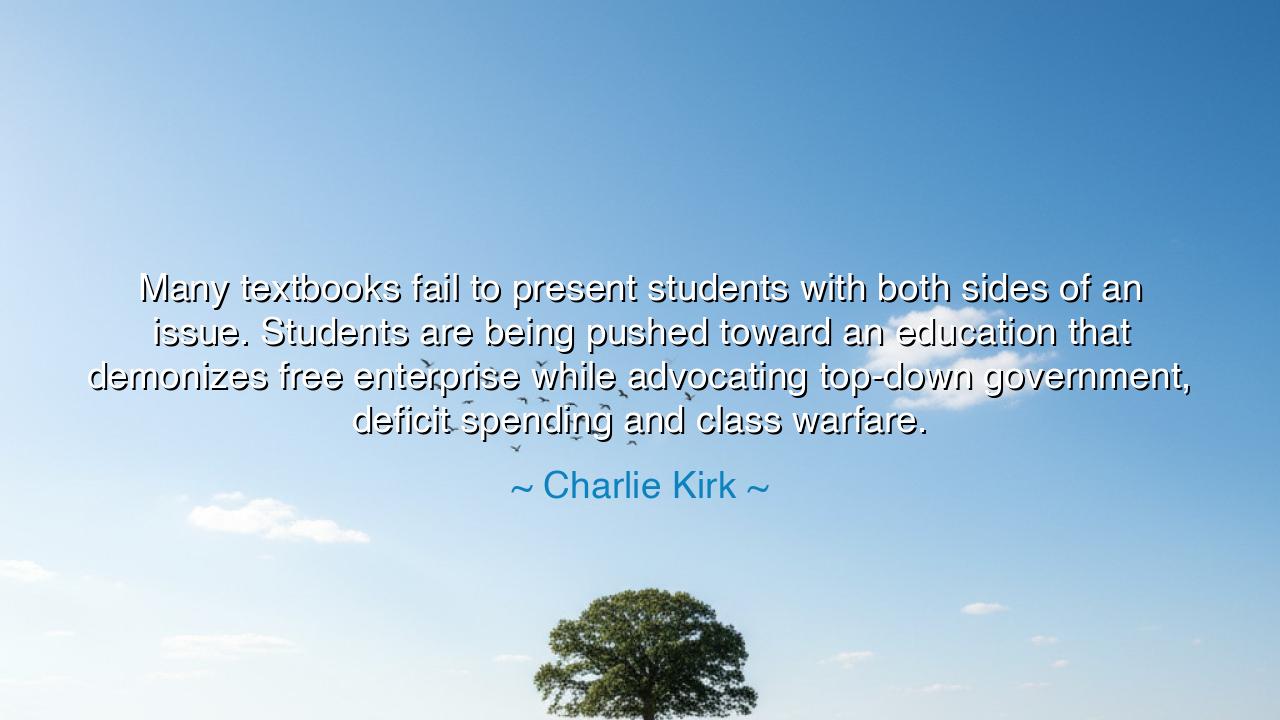
Many textbooks fail to present students with both sides of an
Many textbooks fail to present students with both sides of an issue. Students are being pushed toward an education that demonizes free enterprise while advocating top-down government, deficit spending and class warfare.






The words of Charlie Kirk carry the fire of warning and the tone of an ancient guardian of truth: “Many textbooks fail to present students with both sides of an issue. Students are being pushed toward an education that demonizes free enterprise while advocating top-down government, deficit spending and class warfare.” His message is not merely a criticism of education—it is a cry for balance, for fairness, for the preservation of intellectual freedom. In these words lies a truth as old as civilization itself: that when knowledge becomes one-sided, education ceases to enlighten and begins to indoctrinate. Kirk speaks as one who fears not the presence of ideas, but the silencing of them. For the health of a society depends not on uniformity of thought, but on the collision of truth and error in honest debate.
At its heart, this quote is about the soul of education—about whether schools exist to teach students how to think or what to think. Kirk warns that too many institutions have forsaken the pursuit of truth for the pursuit of ideology. Instead of exposing young minds to the full spectrum of human thought—the triumphs and failures of both capitalism and socialism, the virtues and vices of both freedom and control—they present a single, filtered vision of reality. The result, he suggests, is a generation taught not to question, but to conform; not to weigh evidence, but to repeat mantras. And when this happens, education becomes propaganda, and the light of inquiry dims beneath the shadow of power.
The origin of these words lies in Kirk’s experience as a cultural observer and founder of organizations dedicated to civic awareness and debate. He speaks from years of witnessing the slow transformation of education—from a marketplace of ideas into a system of centralized thought, where certain economic and political philosophies are treated as moral dogmas rather than subjects for analysis. His concern reflects a broader truth that stretches far beyond his own time: every empire that sought to control its citizens began by controlling its curriculum. From ancient Athens under demagogues to modern regimes that rewrite history books, the first step toward tyranny is always the same—the manipulation of memory.
Consider a vivid example from history: in the early years of the Soviet Union, education was reshaped to glorify the state and condemn free enterprise. Students learned not the diversity of economic thought, but the sanctity of collectivism. The market, innovation, and individual effort were portrayed as relics of oppression, while centralized planning was exalted as the only moral path. Within a generation, an entire people had been taught to distrust freedom itself. The result was not equality, but enslavement—to poverty, to censorship, and to fear. The lesson is clear: when education becomes a tool of ideology, the mind of the nation becomes the prisoner of its rulers.
Kirk’s words are thus not a mere political statement, but a defense of the right to intellectual liberty. He reminds us that free enterprise, in its truest sense, is not only about markets and trade—it is about the freedom to create, to dream, to risk, to fail, and to rise again. It is the same spirit that fuels invention, discovery, and art. When students are taught to despise this freedom, they are taught to despise the very force that made progress possible. And when they are told that salvation lies only in top-down government—in the decrees of bureaucrats rather than the creativity of individuals—they inherit not empowerment, but dependence.
Furthermore, his warning against class warfare is a call for unity. For when the young are taught that society is nothing but oppressors and oppressed, they lose sight of the shared humanity that binds rich and poor alike. History has shown that resentment, once weaponized, destroys nations from within. The French Revolution, born from genuine grievances, descended into terror when envy replaced justice and revenge replaced reason. In every age, those who pit one class against another for political gain awaken the darkest passions of the human heart. True reform, Kirk implies, cannot come from division—it must come from understanding, from dialogue, and from the courage to see the world through another’s eyes.
The lesson of this quote is profound and urgent: education must serve truth, not ideology. The classroom should be a forge for reason, not a furnace for indoctrination. Students must be taught not what to believe, but how to weigh belief. They must be shown that freedom and responsibility are twin virtues—that liberty without discipline leads to chaos, but control without liberty leads to decay. To guard the future, every citizen must demand balance in education—curricula that challenge, not comfort; teachers who question, not preach; institutions that honor truth over politics.
And so, let this wisdom be carried forward: a free society cannot exist without free minds. To preserve freedom, we must defend the sanctity of honest education—where opposing ideas are not silenced but tested; where the marketplace of thought is as vibrant as the marketplace of trade. Let us teach our children to think boldly, to question deeply, and to stand firmly upon truth even when it offends fashion. For when the torch of inquiry burns brightly, the darkness of manipulation fades—and the spirit of freedom, once kindled, shall never be extinguished.






AAdministratorAdministrator
Welcome, honored guests. Please leave a comment, we will respond soon